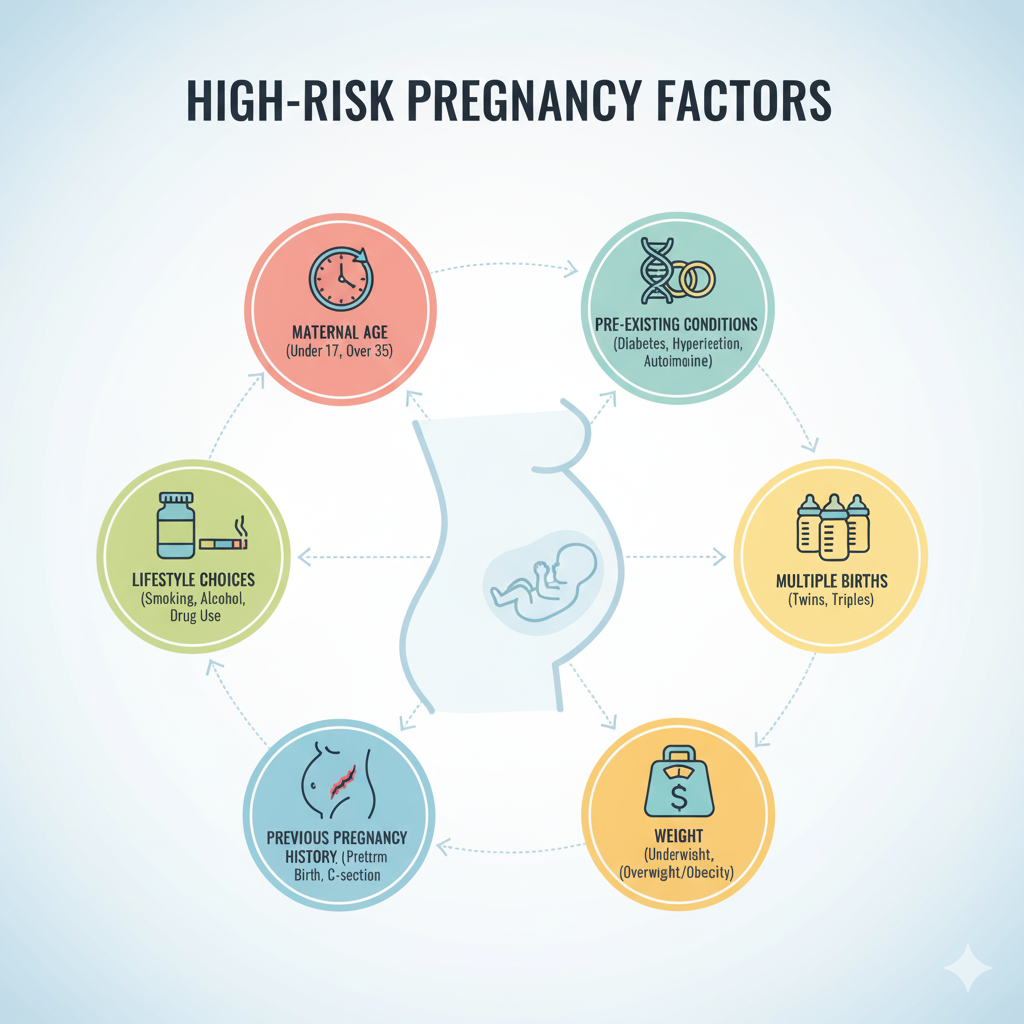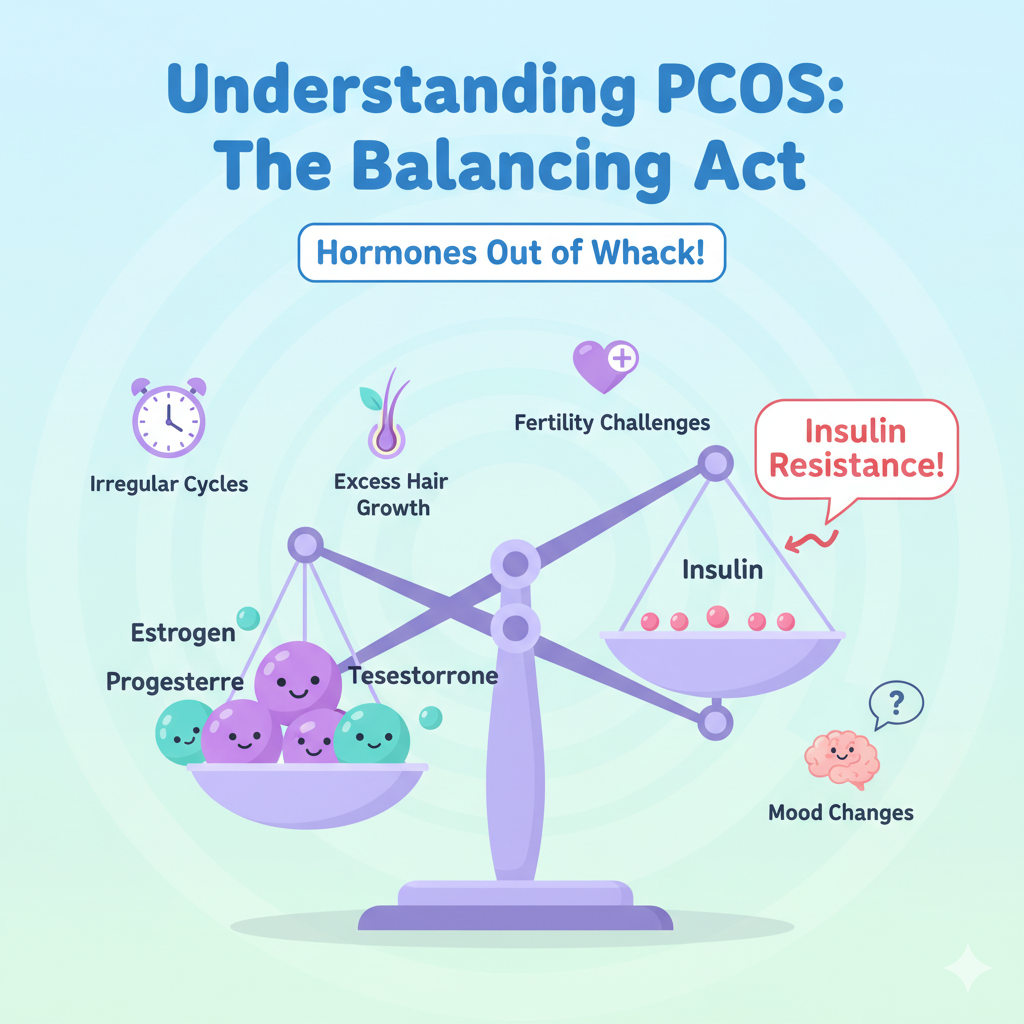Navigating the Path with Care: Understanding High-Risk Pregnancies
Feeling anxious about a high-risk pregnancy? You’re not alone. Learn about the common causes and the compassionate, specialized care options available at Blossom Women’s Clinic to support you and your baby.
Congratulations on your pregnancy! This is a time of immense joy and anticipation. However, for some expectant mothers, this journey may come with the label “high-risk,” which can understandably bring feelings of anxiety and uncertainty.
At Blossom Women’s Clinic, we want you to know first and foremost: a high-risk pregnancy simply means you and your baby may need extra care and monitoring to ensure the healthiest possible outcome. It is a path that requires a more specialized map, and our team is here to guide you every step of the way.

What Does “High-Risk Pregnancy” Mean?
A pregnancy is classified as high-risk when there are potential complications that could affect the mother, the baby, or both. This designation allows your healthcare team to create a proactive and personalized care plan, ensuring that any issues are identified and managed early.
High-risk pregnancies require specialized monitoring and management throughout gestation, labor, and delivery. The classification helps healthcare providers allocate appropriate resources and attention to ensure the best possible outcomes for both mother and baby.
Important to remember: High-risk does not mean there will be problems—it means we are extra vigilant to prevent them. Many women with high-risk pregnancies go on to have healthy babies and uncomplicated deliveries with proper care.
Common Causes of High-Risk Pregnancy
Several factors can contribute to a pregnancy being deemed high-risk. They often fall into a few key categories:

1. Pre-Existing Maternal Health Conditions
- Diabetes: Whether type 1, type 2, or gestational diabetes (which develops during pregnancy), careful blood sugar management is crucial. Uncontrolled diabetes can lead to birth defects, macrosomia (large baby), and other complications.
- High Blood Pressure (Hypertension): This can increase the risk of preeclampsia, placental abruption, and restricted fetal growth. Chronic hypertension requires careful medication management during pregnancy.
- Autoimmune Diseases: Conditions like lupus or multiple sclerosis can affect pregnancy. These conditions may flare during pregnancy and require specialized management to balance disease control with fetal safety.
- Thyroid Disorders: Both overactive and underactive thyroid need to be well-controlled. Thyroid hormones play a crucial role in fetal brain development, making management especially important.
- Kidney Disease: Requires close monitoring of kidney function throughout pregnancy. Impaired kidney function can affect blood pressure and the baby’s growth.
- Obesity: A higher BMI is associated with an increased risk of several pregnancy complications including gestational diabetes, preeclampsia, and cesarean delivery.
- Heart conditions and blood clotting disorders also require specialized care as pregnancy places additional strain on the cardiovascular system.
2. Conditions That Arise During Pregnancy
- Preeclampsia: A serious condition characterized by high blood pressure and signs of damage to another organ system, most often the liver and kidneys. It typically begins after 20 weeks of pregnancy.
- Gestational Diabetes: Diabetes that develops for the first time during pregnancy. It increases the risk of having a large baby and cesarean delivery.
- Placenta Previa: When the placenta covers the cervix, which can cause bleeding. This condition often requires cesarean delivery and may necessitate bed rest.
- Placental Abruption: When the placenta separates from the uterine wall before delivery. This is a medical emergency that can deprive the baby of oxygen and nutrients.
- Multiple Gestation: Carrying twins, triplets, or more increases the risk of premature birth and other issues like preeclampsia and gestational diabetes.
- Fetal Growth Restriction or suspected birth defects require specialized monitoring and potential early delivery.
3. Age-Related Factors
- Advanced Maternal Age (35 and older): Women over 35 have a higher risk of chromosomal conditions in the baby, as well as pregnancy-related complications like preeclampsia, gestational diabetes, and cesarean delivery.
- Young Maternal Age (Teen Pregnancy): Teens are at a higher risk for conditions like anemia, high blood pressure, and preterm birth due to physiological immaturity and socioeconomic factors.
4. Lifestyle and Historical Factors
- Smoking, alcohol use, and substance abuse can significantly impact both maternal and fetal health, leading to growth restriction, preterm birth, and birth defects.
- Previous pregnancy losses or preterm births increase the risk of recurrence in subsequent pregnancies.
- History of pregnancy complications such as preeclampsia or gestational diabetes in a previous pregnancy.
- Assisted reproductive technology (ART) pregnancies, such as those achieved through IVF, have a slightly higher risk of certain complications.
Our Specialized Care Options at Blossom Women’s Clinic
When you entrust your care to us, you gain access to a comprehensive, multidisciplinary team dedicated to your well-being. Our specialized care model includes:


1. Maternal-Fetal Medicine (MFM) Specialists
These doctors, also called perinatologists, are experts in managing complex pregnancies. They use advanced diagnostics, such as fetal ultrasounds and genetic testing, to guide care and support informed decision-making. Our MFM specialists have additional years of training specifically focused on high-risk pregnancies and work closely with your primary obstetrician.
2. Enhanced Prenatal Monitoring
We go beyond standard check-ups. This may include more frequent prenatal visits, specialized ultrasounds (like detailed anatomy scans and Doppler flow studies), and non-stress tests (NSTs) to monitor your baby’s heart rate and well-being. We also offer biophysical profiles that combine ultrasound assessment with heart rate monitoring for a comprehensive evaluation of fetal health.
3. Advanced Diagnostic Testing
We offer state-of-the-art diagnostic tools to give you clear information. This includes:
- Cell-Free DNA Screening: A simple blood test to screen for chromosomal abnormalities with high accuracy as early as 10 weeks.
- Chorionic Villus Sampling (CVS) & Amniocentesis: Diagnostic procedures to detect genetic disorders with high accuracy. CVS is performed at 10-13 weeks, while amniocentesis is typically done at 15-20 weeks.
- Fetal Echocardiograms: To assess the baby’s heart structure and function in detail, usually performed around 18-24 weeks.
- Targeted Ultrasound Scans: Detailed evaluations of specific fetal organs or systems when concerns arise.
4. Coordinated Multidisciplinary Care
For complex conditions like heart disease or diabetes, our specialists work closely with your primary obstetrician and other specialists as needed. This team approach ensures both physical and emotional wellbeing are prioritized for the expecting mother. We regularly hold case conferences to discuss complex patients and ensure all providers are aligned on the care plan.
5. Personalized Birth Planning
We believe in creating a birth plan that prioritizes safety without sacrificing your voice. We will discuss the best location for delivery (often a hospital with a Level III NICU), optimal timing for delivery, and what to expect during labor and postpartum. Our birth plans consider your medical needs while respecting your preferences for the birth experience whenever possible.
6. Preconception and Postpartum Support
Women with chronic conditions benefit from preconception counseling to optimize their health before pregnancy. Postpartum care includes follow-up for conditions like hypertension, diabetes, and mental health to aid in smooth recovery. We offer extended postpartum visits for high-risk patients to ensure a healthy transition after delivery.
7. Emotional and Educational Support
A high-risk diagnosis can be stressful. We provide access to resources, counseling, and support groups because your mental and emotional health is just as important as your physical health. Our clinic offers mindfulness sessions, stress management workshops, and connections to other mothers navigating similar journeys.

Managing a High-Risk Pregnancy: What to Expect
Understanding what lies ahead can help reduce anxiety and prepare you for the journey. Here’s what you might expect when managing a high-risk pregnancy:
Increased Monitoring
You’ll likely have more frequent prenatal visits than in a standard pregnancy. These may include:
- Biweekly or weekly appointments in the third trimester
- Regular ultrasounds to monitor fetal growth and amniotic fluid levels
- Non-stress tests to check fetal heart rate patterns
- Biophysical profiles combining ultrasound and heart rate monitoring
- Doppler flow studies to assess blood flow through the umbilical cord
Possible Lifestyle Modifications
Depending on your specific condition, your care team might recommend:
- Activity restrictions or modified bed rest
- Dietary changes to manage conditions like diabetes or hypertension
- Increased hydration and specific nutrient supplementation
- Stress reduction techniques and adequate rest
Medication Management
Some conditions require medication during pregnancy. Our specialists will:
- Prescribe pregnancy-safe medications when necessary
- Adjust dosages of pre-existing medications to ensure fetal safety
- Monitor for potential side effects for both mother and baby
- Provide clear instructions on proper medication timing and administration
Frequently Asked Questions
Will I need to have a C-section if my pregnancy is high-risk?
Not necessarily. While some high-risk conditions do require cesarean delivery (such as placenta previa or certain fetal positions), many women with high-risk pregnancies can deliver vaginally. Your care team will discuss the safest delivery method for your specific situation as your due date approaches.
Can I still work during a high-risk pregnancy?
This depends on your specific condition and job requirements. Many women with high-risk pregnancies continue working with some modifications, while others may need to reduce hours or take leave earlier than planned. We’ll provide specific recommendations based on your health needs and work environment
Will my baby need to stay in the NICU?
Not all high-risk pregnancies result in NICU stays. However, if early delivery is necessary or if there are concerns about the baby’s health, a NICU stay might be planned. We deliver at hospitals with advanced NICUs to ensure your baby has access to the best possible care if needed.
Can I have a natural birth with a high-risk pregnancy?
Many women with high-risk pregnancies can have vaginal deliveries. However, your care team will monitor you and your baby closely during labor. In some cases, interventions like induction or assisted delivery may be recommended to ensure safety. We discuss all options with you throughout your pregnancy.
Will future pregnancies also be high-risk?
This depends on the reason your current pregnancy is high-risk. Some conditions, like chronic hypertension or diabetes, will make future pregnancies high-risk. Others, like gestational diabetes that resolves after pregnancy, may not recur. We offer preconception counseling to discuss risks for future pregnancies.
You Are a Partner in Your Care
While our team provides expert medical guidance, you are the most important member of your care team. Here’s how you can partner with us:
- Attend all your prenatal appointments and be on time for scheduled tests
- Be open and honest about any symptoms or concerns, no matter how minor they seem
- Follow recommended guidelines for nutrition, activity, and medication
- Ask questions until you feel informed and comfortable with your care plan
- Keep a journal of symptoms, questions, and concerns to discuss at appointments
- Learn to count fetal kicks and report any significant changes in movement patterns
- Take prescribed medications consistently and report any side effects

A Message of Hope and Reassurance
Hearing the words “high-risk” can be daunting, but it is also a gateway to receiving the most attentive, compassionate, and advanced care available. With expert care, continuous monitoring, and compassionate guidance, the majority of high-risk pregnancies result in healthy mothers and babies.
Advances in maternal-fetal medicine have dramatically improved outcomes for high-risk pregnancies over the past few decades. Early detection, careful monitoring, and specialized interventions mean that conditions that were once dangerous can now be successfully managed.
At Blossom Women’s Clinic, we are committed to helping you navigate this journey with confidence, providing the support you need to welcome your little one into the world safely.


